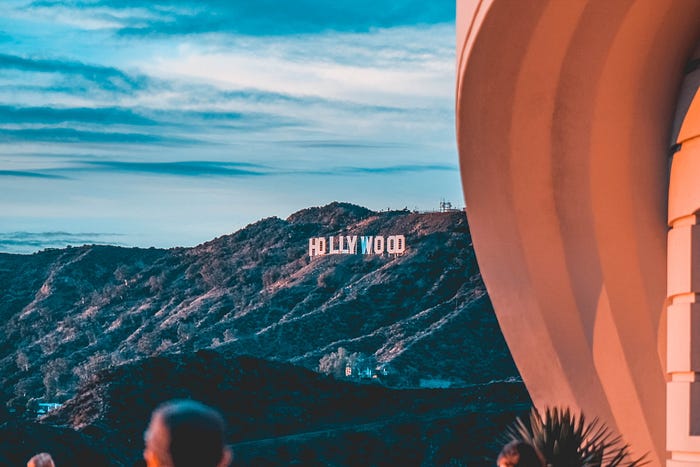Muslims in Cinematics and the Lost Legacy

Cinematics are not just a form of entertainment it’s also a bridge between nations. Moustapha Akkad was the first Muslims director to make an impactful change in representing Muslims in a positive way in front of the world. It’s crucial to portray ourselves positively in cinematics. The 9/11 bombings of New York city did play its devastative role in depicting Muslims in Hollywood. Landscapes too play a role in cinematics.

Moustapha’s Legacy
Moustapha migrated in an early age — 19 years old — from French Syria to USA to study theatre arts at UCLA with nothing but $ 200, a copy of Holy Quran, his travel ticket and his father’s words: “All I can do for you is to give you these. From now on, I may or may not see you again. Never forget, my prayers are with you”.
He was so determined to display the true heritage and principles of Muslims to the world. He filmed two of the most famous Islamic-background movies in history: The Message, and the Lion of the Desert. However, the depiction of the companions and prophets in cinematics is a bad idea because of religious reasons.
Moustapha did collaborations with MGM studio to produce “Ride High Country” about Algerian insurgency against France as well as with CBS in “As others see us”, which was about different ethnicities in America. Though he produced many movies and collaborating with many international cinematics studios in a career of thirty years, Hollywood didn’t celebrate him or give him any prize. Was it because of his Arab-Muslim identity? I don’t know.
He was going to produce two other impactful movies about Saladdin the Ayyubid the liberator of Jerusalem and Mehmett II the conqueror of Constantinople, but fate had other opinions. Moustapha died along with his daughter in Jordan, 2005 in her wedding party at the Radisson by radical Muslim terrorists! Thus, the image of that ambitious young man with huge dreams and legacy to demonstrate his Muslim heritage, culture, and principles died alongside with him.
The dilemma of 9/11
Due to terrorist attacks made by Osama bin Laden against the USA, everything between the Muslim World and the West changes forever and we’re still not recovering from that impact. Osama’s ignorant and inhumane attack gave a huge increase in Islamophobia amongst the people of the western world. Of course, this also made a negative impact on Muslims by creating a dilemma of misrepresenting Muslims in Hollywood and other western film production companies along with other geopolitical problems.
A bridge
Cinematics serve not only as a way to entertain ourselves. They are also a bridge to exchange cultures, ideas, traditions, religion between nations and even between different historical periods. The Pentagon purchased around a hundred thousand copies of the Message for its troops before sending them to Afghanistan in order to understand the cultural and religious background of the Afghan People in general.
Impact of misrepresentation: Why should we care?
The misrepresentation of Muslims in cinematics can affect the polls, opinions and votes of people in the Western world and other parts of the world and may as well lead to giving a green light for governments to send military troops to Muslim countries, enforce economic sanctions or travel bans against Muslims.[1]
So yes, cinematics does influence the decisions of super powered countries like USA, UK, France, Russia, China and other countries in our Muslim lands, policies, laws, culture, identity, and livelihoods.
On the other side of the coin, when Muslims view these negative portrayals they feel with more discrimination, hatred, exclusion, and maybe feeling with the wrong shame of showing their beliefs and culture. This will impact Muslims by: erasing the Islamic identity in Muslims, isolation from the international community or western communities, or the worst-case scenario: create more blood-thirsty criminal terrorists, and all of these are unwanted outcomes by both Muslims and the sane western world.
Examples of misrepresentation
Muslims contributed to the western civilization with Algebra, which is the backbone of modern algorithms and computing, cartography by Al-Idrisi, photography by ibn Al-Haytham, military tactics by Khaled bin Al-Waleed. It’s so unfair to demolish all of this with negative portrayals of Muslims in Hollywood.
According to the BBC, one of the most controversial cinematic production was “Homeland”.
But aside from the obvious false portrayal of Muslims as terrorists, camel riders, barbaric, women as belly dancers, ignorant people with no education. There is another type of false portrayal, which is the embedded hidden false portrayal.
In the video below is a scene from Warner Brothers’ “Arrow” in which the head of the league of assassins is killing the main character and saying Muslim supplications, and not any kind of supplications. A big part of the supplications is the one we say at the end of each prayer five times a day. This is a kind of embedded misrepresentation honestly to correlate our supplications with a violent fantasy league of assassins.
Another one is in Netflix’s animated series Castlevania in which a character falsely explains one of the sayings of the prophet Muhammed — peace be upon him — in which he says that he’s fulfilling the prophet’s prophecy that no human will be left in Hell in the future. Now in Islam we believe that Hell has seven levels. One of these levels is where the sinner Muslims are being tortured for their sins but they won’t be staying there for eternity because they are believers after all unlike the infidels who are living for eternity in Hell. That’s the correct meaning of the saying. Honestly, I believe this is way too offensive as we hold the sayings of the prophet as holy script side by side the Holy Quran.
Another funny irresponsible misrepresentation is the one in Vikings series where the director wanted viewers to see Muslims as more barbaric than the Vikings.
“In the mind of the Isis recruit, he’s a version of James Bond, right? Everyone thinks they’re the good guy. Have you seen some of the Isis propaganda videos? They’re cut like action movies. Where’s the counter-narrative? Where are we telling these kids that they can be heroes in our stories?”
Riz Ahmed
Examples of good representation
These days we’re witnessing positive portrayals for Muslims in the cinema making them appear as main characters or heroes like captain Marvel in Marvel’s studio productions. For instance, CBS’s FBI series in which a Muslim FBI special agent is depicted as a hero fighting the crime. Another nice portrayal is in the “Kingdom of Heaven” when Saladin was perceived as a just character with strong integrity.
Another good representation in Vikings again is when Floki enters a mosque and gets awed by the devotion of Muslims in their prayer.
Mixed representation
Now a mixed representation of Muslims is a portrayal of both the bad Muslims and good Muslims in cinematics. Like the case in Amazon’s Jack Ryan in which a Muslim CIA agent along with other members are fighting terrorists like Musa bin Suleiman. If you ask me, this would be a fair way portray Muslim Communities. You shouldn’t generalize negative cases for all Muslims and it’s improper to consider Muslims as an angelic beings with no sins.
“The media runs the world. No tanks or planes. The media and the public companies.”
Moustapha Akkad.
Ouarzazate
You’ll notice that most of the movies and series that brings Muslim culture are filmed in Morocco. This is because Morocco is near to European Movie Studios and is the nearest Arab-Muslim Country to Hollywood geographically with vast amount of medieval, renaissance, and industrial historic sites along with desert landscapes making it the perfect country for any movie director to film a Muslim-background cinematics or even desert-based fantasy cinematics. And this another aspect that we should take care about which is: utilize and monetize the natural and historical landscapes.
Studios
I’ve researched IMDB to find out the movies and series that included Muslim characters and Islamic beliefs and came out with this result:
Now these are many cinematic productions about Muslim culture and beliefs, but the question is: how many of them depicted us positively and how many depicted us negatively?


In the second data visualisation above that I’ve created, cinematic productions that included Islamic beliefs and/or Muslim characters were somehow dormant since the 1920s, which was the time in which the world was still recovering from World War 2 until it started to increase in the 1960s which basically the time when the gulf countries started trading oil with the West and the continuous conflicts between the Muslims and Israel and the first series were produced in the 1960s. Then it increased in a very interesting manner when there was slight frictions between Muslims and the West in the 1990s. Like the event of economic sanctions enforced on Sudan. Of course the major spikes and outliers appeared after 9/11/2001 where most of today’s cinematic productions that included Muslim Characters and/or Islamic beliefs were produced. Most of them were produced after 9/11/2001.
You can view the interactive data visualisations in detail in my Tableau profile’s page: https://public.tableau.com/app/profile/ahmedelaffendi/viz/MuslimsinCinematics/MuslimsinCinematics
The Riz Ahmed Test
The Muslim actor, Riz Ahmed created a wonderful initiative, which is the “Riz Test”
Why’s Moustapha’s Legacy lost?
Although there are movies and series produced by several Muslim studios, they’re not as good as Moustapha Akkad’s movies. You see, the difference between Moustaphas contributions and the modern movies and series by Muslim countries is that Moustapha focused on displaying heritage, correct history, and correct Islamic principles to the world and Muslim generations to come. Take for example the series about Omar bin Khattab “Omar” in 2012. The director falsely and brazenly depicted Omar entering Jerusalem in a pompous arrogant manner while the true fact, the Bible, and all correct and reliable Islamic history books and references stated the following: Omar entered Jerusalem on his feet along with his servant only all the way from Medina with absolutely no bodyguards, or army to receive the keys of Jerusalem. His clothes had seventeen sewed holes.
Now this very obvious fact with huge impact on readers, viewers, and whoever hears it is omitted from the series, so what can you expect from it or any other similar series. Why are these so-called Muslim-produced movies and series are not depicting facts and principles as they’re? I don’t really know.
What if Moustapha Akkad was alive today?
In my opinion, If Moustapha Akkad was alive today he was going to create an online streaming service and studio that will compete with Netflix to produce positive view Muslim-background historical dramas, documentaries about environment, culture, biographies, and stream other international productions.
Conclusion
Cinematics can help communicate many other aspects to different nations. Moustapha Akkad left a great legacy, but we wasted it into vain. Portraying ourselves will impact our lives ideally, and neglecting this duty will do vice versa. The 9/11 violent events damaged both westerners and Muslims. Landscapes will have a major role to create positive portrayals.
Sources:
[1]https://www.start.umd.edu/news/news-media-affects-how-muslims-are-perceived-treated
